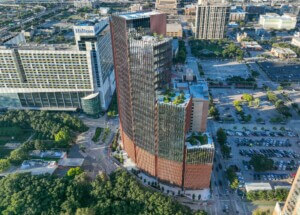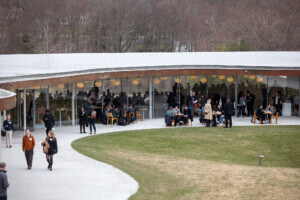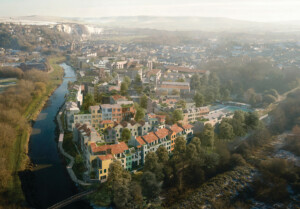A little over a month ago, I traveled to Los Angeles for the CarbonPositive Conference and Expo, along with about 200 of my peers from the architecture, planning, and construction fields. Giving the keynote address was Ed Mazria, founder of the Architecture 2030 initiative and one of my personal climate-action heroes.
Mazria eloquently summarized the state of the climate crisis. The good news: Following a historic decoupling of GDP growth and emissions in the U.S., greenhouse gas emissions have plateaued despite significant economic growth between 2005 and 2019—and we are now at the beginning of the same decoupling globally. The bad news: The time for preventive measures is over, as we find ourselves at the very center of climate change.
Now back in Chicago, I am marking the 50th anniversary of Earth Day in quarantine by pondering over Mazria’s even-keeled prognosis. I’m also thinking about Greta Thunberg, whose address to the World Economic Forum in September put things even more bluntly: “Our house is on fire.” While there are a lot of questions about this fire that we need to answer—What went wrong? How will we pay for everything? Where, and perhaps how, will we live now?—the first steps seem simple: stop everything, save others, save ourselves. Crises bring clarity to what matters most.
The current global pandemic provides a different parallel to the climate crisis, this time from the world of epidemiology. For weeks now, the prevailing national discourse has come to us through the medical language of symptoms, transmission, and underlying conditions. But the human story is far more revealing. While individual viruses do not discriminate between hosts, the epidemic does, disproportionately impacting people based on wealth, ZIP code, insurance status, job security, and the color of their skin. Illuminating the perils of ignoring known threats and exposing the real cost of social inequity, COVID-19 has pushed many of us to reconsider much more than our epidemic preparedness. With so many signs and warnings, how did things get this bad?
The atmosphere, much like the novel coronavirus, will not simply back down in response to our anxieties and isolated efforts; neither carbon nor pathogen will respond to anything short of a well-coordinated and collective effort. If my neighbor shelters-in-place but I do not, the epidemic ensues. If she recycles and reduces her environmental footprint, but I do not, the planet still loses. But rather than simply diminishing the importance of the determined individual, this situation highlights our overwhelming need for the leadership each of us is capable of providing.
To collectively address these crises, we need all the technological solutions we can imagine, combined with bold government action. But what we also need, in equal measure, is a shift toward social innovation and a reinvention of our own attitudes. In his 2017 book Drawdown: The Most Comprehensive Plan Ever Proposed to Reverse Global Warming, environmentalist Paul Hawken argues that humanity has undergone an existential “Othering,” by which the species has conceptually elevated itself above the natural world. As he explained in a talk at the Illinois Institute of Technology last September, repairing this rift entails a sort of “coming home,” a return to harmony with the planet.
As I consider my own path forward, I’m also inspired by another of Hawken’s observations: Either we despair in the thought that the climate crisis is happening to us, or we decide that it is happening for us. Before our home is lost to the fires raging around us, can we use the crisis as an opportunity to step back and envision an alternative way forward?
Pandemics and climate change do not affect us all equally. Nevertheless, the immediate steps needed to stall the crises, and the longer-term solutions that might reverse their effects, cannot be undertaken alone. We are truly in this—in all of this—together.
Tom Jacobs is a partner at Krueck + Sexton Architects in Chicago and co-founder of Architects Advocate for Action on Climate Change.











